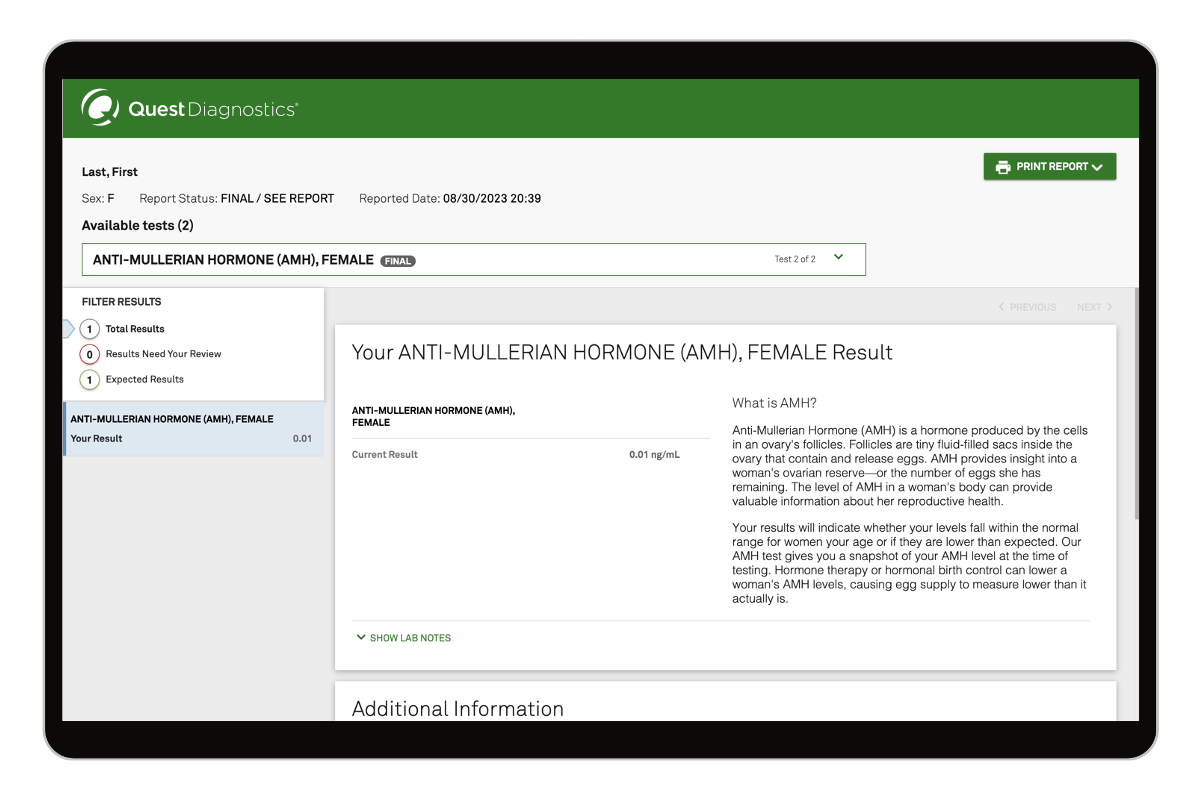AMH Marker Test
This AMH test measures your ovarian reserve (or egg supply) and provides helpful insights about your personal pregnancy journey. Read moreFor the most accurate results, see ‘Preparing for your Sample Collection’ section below for details.
The ovarian reserve assessment marker test measures anti-mullerian hormone (AMH) levels, which indicate the approximate number of eggs in your ovaries. While the AMH blood test helps assess your reproductive health and egg supply, it doesn't predict fertility.
AMH is a go-to hormone for helping women understand their ovarian reserve. AMH levels naturally decline with age, but not at the same rate for everyone. This AMH hormone test can be helpful for women who want to know if their ovarian reserve is declining faster than normal, signaling a shorter window for pregnancy.
In general, higher AMH levels indicate more eggs and a higher ovarian reserve. Additionally, lower AMH levels means fewer eggs and a lower ovarian reserve.
Buy your own AMH test online with Quest. No doctor’s visit is required – simply purchase your AMH testing, visit a nearby Quest location for sample collection, and get fast results.
How it works
questhealth.com offers 100+ consumer-initiated Quest Diagnostics lab tests to empower you to have more control over your health journey. Choose from a variety of test types that best suit your needs.
Although AMH levels correspond to your egg count, it does not indicate whether you are fertile or infertile. It is just one piece of your overall reproductive health. Regardless of your AMH level, other factors could affect your ability to get pregnant (such as age, medical conditions, irregular ovulation, blocked fallopian tubes, uterine abnormalities, your partner’s sperm count, your partner’s sperm motility, and others).
As we age, the number of viable eggs slowly decreases, producing fewer egg-releasing follicles and as a result, less AMH. Low levels of AMH may indicate a low number of viable eggs, decreasing the potential for an egg becoming fertilized.
Low levels of AMH could mean that your ovaries are preparing fewer follicles to release eggs. Several factors may contribute to fewer follicles, including age, chemotherapy, genetics, the environment, and smoking.
Even if your AMH is low for your age, you may be able to conceive. AMH levels indicate your ovaries are producing some of the follicles necessary for eggs to be released—and it only takes one egg to become pregnant.
Additionally, this test can help a doctor determine how likely fertility treatment will work. Together, you and your doctor can discuss your reproductive health and pregnancy planning.
AMH tests are used by doctors and fertility specialists to determine a woman's egg supply when she’s experiencing infertility or waiting to conceive and wants to know her egg supply level.
Doctors also use this test to assess menstrual disorders (like PCOS), help determine a woman’s menopausal status, or assess ovarian function in women after cancer therapy.
Although higher AMH levels can indicate a higher egg supply, AMH levels may be higher in some women with polycystic ovary syndrome (PCOS). Symptoms of PCOS include:
- Menstrual disorders, including early menopause or irregular or missed periods
- Acne
- Excess body and facial hair
- Decreased breast size
- Weight gain
Low levels of AMH may indicate that your egg supply is starting to decline. When considering fertility options (including conception or harvesting eggs for future use) it’s important to discuss all options with a doctor.




